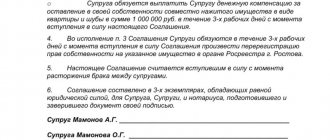How to file a counterclaim for division of joint property
Average rating 5 from 2 users
It is a rare case that a trial involving property disputes between spouses proceeds calmly without significant disputes. Filing a counterclaim for the division of jointly acquired property in 2020 helps resolve a number of them. The grounds for drawing up and considering such documents are set out in the Code of Civil Procedure of the Russian Federation. In addition, a plaintiff who wants his demands to be satisfied should, when drawing up an application, be guided by the RF IC and the RF Tax Code. In some cases, it may be necessary to refer to federal laws, for example, if property was acquired using maternity capital (RF Federal Law No. 256).
Reasons for filing
Current practice shows that the main reasons for filing counterclaims in cases considering the issue of division of property of divorcing spouses are:
- Circumstances that make it necessary to re-examine a civil case, e.g.:
- a statement of claim by one may entail infringement of the rights of a common child;
- counterclaims are justified by a preferential financial contribution to the needs and well-being of the family, compared to the contribution of the other spouse;
- the disputed property is not subject to division . For example, the subject of the dispute is property that belongs to a party on the basis of personal property (inheritance, gift)
- counterclaims operate on facts that have a complementary function to the primary claim . For example, if the subject of the claim is divorce and payment of alimony, then the second party in the case may present counterclaims for the division of property and debt obligations.
Pre-trial dispute settlement
If a counterclaim is filed for the division of common property, then the need for a mandatory pre-trial regulation procedure disappears. Moreover, the spouse is not obliged to put forward proposals for a peaceful resolution of the property dispute, nor to send a notice to the other party that he wishes to appeal to a judicial authority. However, during the hearings, spouses can exercise the right to divide acquired property on the basis of a settlement agreement.
Lawyers recommend that you prepare an agreement that will indicate the procedure for dividing the common property. The document should be sent to the second spouse. Even if he does not accept this proposal, such an initiative is always taken into account positively in the legal process.
When can I submit?
A divorcing husband and wife can divide property in two ways : by mutual agreement or through the court.
In some cases, demands for the division of such property may arise not only as a reason for filing an initial statement of claim, but also as separate circumstances not affected by the statement of claim that are directly related to the objective resolution of the issue of division of jointly acquired property.
If such circumstances arise at the time the court is considering the claim, the defendant has the right to file a counterclaim.
If the counterclaim was filed after the judge was removed to the deliberation room or the opening of proceedings on such a claim was refused, the defendant has the right to file an independent statement of claim, setting out all the arguments and circumstances specified in the counterclaim. To avoid such consequences, it is necessary to navigate the conditions that determine the possibility of filing a counterclaim. These could be:
- A counterclaim is based on the principle of offsetting the original claim . This principle is spelled out in Art. 410 of the Civil Code of the Russian Federation and provides for the termination (full or partial) of the initial obligation in the event of a counterclaim of the same kind being presented. In addition, Art. 411 of the Civil Code of the Russian Federation indicates the inadmissibility of using offsets for claims related to:
- with compensation for harm caused to life or health;
- with lifelong maintenance;
- with the collection of alimony payments;
- the statute of limitations for filing a claim has expired.
- The court's recognition of the validity of the claims of the counterclaim excludes the possibility of satisfying the claims reflected in the original claim. This case occurs if the subject of the trial is the recognition of property rights to property of one of the spouses.
- There is a connection between the requirements of both claims. This can contribute to a more objective consideration of the case, as well as significantly speed up the process. This circumstance is most often encountered in judicial practice regarding family law disputes. As a rule, the subject of claims is the division of joint property of the spouses.
What is a counterclaim for division of property?
During a divorce, the main point of concern for both spouses is the division of property that they acquired during the time they were married.
If, before entering into marriage, an appropriate marriage contract has not been drawn up, which predetermines the answers to all questions (although in certain circumstances it can also be challenged) related to the acquired property, and if the marriage breaks up, the property has to be divided after the fact. One of the documents that can determine the future owner of common assets is a counterclaim for division of property. Such a statement is filed to challenge the other party’s original claim and is aimed at protecting the rights of a person (naturally, from the point of view of the plaintiff). Read more about what documents are needed for a divorce.
Design rules
Considering the fact that the counterclaim for the division of property of the spouses is based on the same principles and circumstances as the initial statement of claim, both of these documents are drawn up in the same form , which is provided for by the requirements of Art. 131, 132 of the Civil Procedure Code of the Russian Federation.
The only feature that differs between these documents is the subjective position of the defendant regarding the subject matter of the dispute under consideration.
What points should it contain?
When drawing up such a counterclaim, first of all it is necessary to be guided by the requirements of Art. 131 Code of Civil Procedure of the Russian Federation. Thus, this article provides for a mandatory written form of the document and the structure of its preparation , which is as follows:
- The header of the claim, which reflects the name of the court and its location. In addition, this section indicates the details of the parties to the process, such as full name, address of residence or registration, as well as their contact information.
- Description of the subject of the disputed relationship.
- Reflection of the fact that the initial claim is pending in court, indicating the date of its filing, the opening of proceedings on the said claim, the subject of its consideration, etc.
- A detailed statement of all the circumstances regarding the current situation between husband and wife. Such circumstances include data on the date of marriage and divorce, the presence of joint children, the reasons why, according to the applicant, mutual understanding in the relationship has significantly deteriorated, as well as giving examples of specific situations confirmed by facts.
- A precise description of each item of property that, according to the counterclaim, is to be divided between the spouses. In this case, the external data of such things, individual features such as the serial number or brand of the manufacturer, the circumstances of their acquisition are also reflected, the market value of each thing, the degree of wear and general condition are indicated. If desired, you can indicate which of the spouses is in use of this or that disputed property.
- A statement of the grounds for filing counterclaims, which are important for the court to fully and comprehensively consider the original claim on its merits.
- A description of the reasons why the plaintiff believes that his property rights are being violated, such as the restriction of access by the second spouse to the disputed property, the risk of damage to it by the latter, as well as the reasons why the agreed property after the divorce should go to the defendant.
- Reflection of the cost of the claim, which is determined on the basis of the above circumstances. In case of disagreement on this issue, the property specified in the claims is subject to expert evaluation. In addition, if there is no compromise on the valuation of the disputed property, the price of the claim may be determined by the court.
- A statement in the operative part of the claim of counterclaims that reflect the plaintiff’s vision regarding the legality of the division of personal property of the spouses.
- List of all documents required by law.
Sample filling
Filing a claim and related documents
At its core, the procedure for filing a statement of claim making counterclaims is no different from the same procedure when filing a regular claim .
The only difference is the jurisdiction rule.
This difference is reflected in Article 31 of the Code of Civil Procedure of the Russian Federation, which provides that counterclaims regarding the subject of the dispute of the original claim can only be considered by the court that is hearing such a claim.
Taking into account the fact that the presentation of counterclaims is possible at any stage of the legal proceedings on a claim for the division of property of spouses, the following nuances should still be taken into account:
- Before starting proceedings on the substance of the stated claims, the court informs the defendant about the latter’s rights within the framework of the trial, including the right to file a counterclaim. However, the defendant is vested with this right only in the case of consideration of a property dispute in the courts of first instance. In appeal proceedings, counterclaims cannot be presented.
- The best option for filing a counterclaim is the pre-trial stage . This will significantly speed up the process of consideration of the dispute and will help to avoid prolongation of the trial due to the re-clarification of the circumstances of the case in connection with new data substantiating the counterclaims, as if the counterclaim had been filed at the final stage of the trial.
- There are situations when the defendant in a claim for the division of jointly acquired property decides to present counterclaims already during the consideration of the case on its merits. In this case, the court suspends the proceedings in this case and gives the interested party time to prepare the appropriate statement of claim. In the determination to postpone the date of consideration of the case, the judge reflects the circumstances preceding the adoption of such a decision, and also indicates a list of necessary actions that must be performed by the parties during the appointed break.
State duty when filing a claim
The state fee for filing a counterclaim in accordance with the Tax Code of the Russian Federation is calculated based on the value of the property and is determined as follows:
- if the cost does not exceed 20 thousand rubles - in the amount of 4% of it, but not less than 400 rubles;
- from 20 to 100 thousand rubles – 3% of the total cost, but not less than 800 rubles;
- from 100 to 200 thousand rubles – 2% or 3200 rubles;
- from 200 thousand to 1 million rubles – 1% or 5200 rubles;
- if the value of the property exceeds the threshold of 1 million rubles, then 13.2 thousand rubles (0.5%).
In addition to paying the state fee, the plaintiff may also face other costs associated with seeking advice from a lawyer or providing the services of a lawyer.
So, filing a counterclaim for the division of jointly acquired property is a process that can take you a lot of time, since its implementation must occur strictly within the law and according to existing rules. However, if there is evidence that your rights are affected, then such a procedure is definitely worth carrying out and achieving justice.
Can the court refuse to accept it?
However, courts do not always agree to consider the defendant’s counterclaims. In most cases, when refusing to satisfy a petition to accept a counterclaim, the courts are guided by a violation of the requirements provided for in Art. 138 of the Code of Civil Procedure of the Russian Federation, namely the absence of any connection between such claims and the subject of the original claim.
The Constitutional Court of the Russian Federation adheres to the same position in its ruling dated July 16, 2015, in case No. 1726-O.
However, even if all the conditions provided for in the above article of the Civil Procedure Code of the Russian Federation are met, the court reserves the right to take the following actions in relation to the declared counterclaim:
- Leave the claim pending . Such measures of influence are applied by the court in cases of non-compliance of the document with the norms provided for in Art. 131, 132 Code of Civil Procedure of the Russian Federation. In this case, the party is given time to correct all inaccuracies and violations.
- Return the statement of claim . In the case of claims related to the division of joint property by spouses, the only reason for return may be the absence of a signature of the party who drew up such a document.
Important! When the plaintiff refers to the statute of limitations, the latter should remember that, in accordance with Art. 200 of the Civil Code of the Russian Federation, such periods begin to be calculated from the moment of violation of the plaintiff’s property rights, for example, when restricting or preventing the use of the disputed property.
Attached documents
Article No. 132 of the Code of Civil Procedure of the Russian Federation provides a list of papers that must be submitted together with the claim:
- a photocopy of the counter-statement for each participant in the process;
- receipt of payment of state duty;
- marriage/divorce registration certificate;
- passport;
- confirmation of ownership of the object of dispute;
- documentary evidence of the validity of the defendant’s property claims;
- property valuation;
- power of attorney (if the defendant is represented by a third party).
Copies of the above documents are submitted along with the claim. Therefore, you should prepare them in advance.
The court determines that the disputed property belongs to jointly acquired property if it was acquired after the registration of the marriage and before its annulment. The date of purchase is determined based on the receipts, bank statements, etc. provided. The value of the subject of the dispute is determined on the basis of a written report from the appraisal organization.
Procedural legislation allows in claims to indicate information about witnesses, in addition to mandatory documents. At the court hearing, witness testimony and documentary evidence of the circumstances of the case will be taken into account.
Payment of state duty
According to current legislation, payment of the state fee is one of the main conditions for opening proceedings in civil proceedings. The specified contribution must be made by the person who filed the claim, including the counterclaim.
The amount of the state duty is calculated based on the price of the claim , the amount of which is established by assessing the entire disputed property.
Subtleties in various situations
Loans
Family law establishes that the joint assets of spouses are divided in half, unless they have specified other conditions in the marriage contract. These rules also regulate how common debts are divided.
However, during the dissolution of the marriage through the court, the husband or wife may try to transfer part of their debt obligations to the other spouse. To defend your rights, you need to understand which loans are considered joint and which are personal, and legally substantiate your position in a counterclaim.
Funds received under loan agreements will be considered general if:
- The loan money was taken by one of the participants in the marriage relationship, but it was spent on family needs.
- Both spouses borrowed funds and are official borrowers under the loan agreement.
Debts are recognized by law as personified in the following cases:
- Borrowing finance for transactions that are personal in nature, for example, paying for dental treatment at a dental clinic.
- Receiving credit money to pay for damage caused by one of the spouses when he committed an administrative or criminal offense.
- Borrowing money to cover debts arising from obligations on the spouse’s personal business.
Thus, in a counterclaim you need to describe the current situation and provide evidence confirming the defendant’s point of view if:
- The plaintiff is trying to convert some of his personal debts into joint debt.
- The plaintiff formally took money from a targeted loan for the joint needs of the spouses, for example, to purchase a family car, but in fact spent it on satisfying personal desires.
Real estate
According to the legal norms enshrined in Article 30 of the Civil Procedure Code, statements of claim, the subject of which is real estate, must be submitted for consideration to a court located in the same locality as the disputed real estate. These rules also apply to counter-objections from the defendant.
But, if the defendant adds to the list of his own claims in the counter statement real estate located in another city and of greater value, then he is obliged to send it to the district court of the locality where the most expensive property of all the real estate included in the subject is located spore.
For example, if a wife, acting as a plaintiff, demands the division of an apartment located in Nizhny Novgorod and valued at 2 million rubles, then, according to the rules of jurisdiction, she submits an application to one of the district courts of this city. However, if the defendant wants to include in the subject of the proceedings the personal residence of his wife in Moscow, which is estimated at 6 million rubles, and wants to divide it, then he needs to send a counterclaim to the Moscow district court, because the most valuable real estate asset for which division The spouses are arguing among themselves, located in this city.
Having children
Based on the analysis of Russian judicial practice, the presence of a minor child in a married couple affects the division of joint property as follows:
- The parent, who, after the termination of the marriage, will live with the child and raise him, usually acquires more when dividing assets than could be due to him by law.
- The other parent, usually the ex-husband, bears the child support burden.
Since in most divorce proceedings wives are on the plaintiff’s side, and husbands are on the defendant’s side, in order to ensure that when dividing things the defendant does not allow significant property losses, it is necessary to provide evidence (written or testimonial) in the counterclaim, if the circumstances below are actually present in your situation:
The spouse does not care about the child, about his socialization, education and moral development.- The wife abuses parental power, namely, prevents the child from studying in an educational institution, inclines him to illegal behavior.
- Your other half abuses your children, beats them, insults them and humiliates them.
- The spouse is addicted to drugs or alcohol and because of this does not take care of the children.
- The wife suffers from a disease that does not allow her to properly care for and raise the children.
If the defendant manages to convince the judge of the truth of his point of view, then he will be able not only to independently raise his own children, but also to receive additional property, which the courts allocate to the ex-spouse living with the children, in order not to violate the child’s housing rights and his rights to decent living conditions.
As for alimony payments, you can reduce their amount awarded for monthly payment by court decision as follows:
- If the defendant is employed, then it is possible to agree at the place of work in the accounting department to reduce the official (“white”) salary and transfer part of the earnings to the “gray” range. Then, in the counterclaim, write its reduced size and attach a certificate of income received from the employer to confirm your words.
- If the defendant does not have a regular income or is engaged in business, then he can reduce the amount of income indicated in the tax return, according to information from which the judicial authority will calculate the amount of alimony payments in the form of a fixed amount of money, and write a reduced amount of income in the counterclaim. It should be understood that manipulation of tax documents may result in criminal prosecution. However, an entrepreneur has no legal ways to reduce alimony payments.
Disagreement with the assessment
In this case, the defendant should do the following:
- Before filing counter-objections, order an assessment of the joint property from a professional appraiser in order to understand whether the plaintiff’s assessment is fair.
- If the assessment of the value of assets indicated in the plaintiff’s statement and given in the conclusion drawn up on your order differs, then you need to check what the assessment of the other party to the lawsuit is based on. If based on your own conclusions, then it is necessary to attach the appraiser’s conclusion to the counterclaim. It will be significant evidence of the value of the counterclaim. If the conclusions of a qualified specialist, then, in addition to submitting the result of the work of your property appraiser to the court, it is necessary to convince him to attend a court hearing in order to testify and explain the methods he used to estimate the value of the disputed items.
What happens after?
After the defendant in the case files a petition for consideration of a counterclaim with all the necessary documents, there are two options for the development of events:
- Done in accordance with all the requirements of substantive and procedural law, the counterclaim is accepted into the proceedings of the court considering the original statement of claim. After this, the court continues the trial, but taking into account all the data reflected in the counterclaims, and subsequently makes a final decision.
- If the counterclaim does not comply with the requirements provided for by the Code of Civil Procedure of the Russian Federation, then such a claim is left without progress , returned for revision, or even entails a refusal to accept it for consideration. In the latter case, the person is deprived of the right to re-file the said claim in the same court. However, this does not prevent the latter from exercising his right to file an independent statement of claim with similar requirements for consideration by the court in separate proceedings.
Arbitrage practice
The court considers the claims of the parties jointly, and studying the documentary evidence presented by the parties - receipts, checks, contracts, invoices - establishes the following circumstances:
- The period during which the parties were married - from the moment of registration of the marriage until the moment of dissolution. This allows you to determine the status of property acquired during marriage (common marital property) and outside marriage (personal property);
- The full composition of joint property, location and value of each property;
- Composition of the disputed property - moment and basis of acquisition, cost, location;
- Grounds for changing the marital property regime (from joint to personal) – marriage contract, marital agreement on division of property, settlement agreement;
- Circumstances that serve as the basis for changing the size of marital shares;
- Compliance with the statute of limitations for the division of joint property. According to Article 200 of the Civil Code of the Russian Federation, the limitation period begins when the right of ownership of joint property is violated or when the owner learns of such a violation;
- A list of property that will go to each of the co-owners after division.
- Other circumstances.
Having found out all the above circumstances, listened to the arguments and considered the claims of each party, the court makes a decision. The court may fully satisfy the claims of one of the parties, refusing to satisfy the claims of the other party, or partially satisfying the claims of each of the parties, for example, by means of offset. If the court decision does not satisfy the plaintiff or defendant, the party has the right to appeal it within a month to the appellate court in accordance with Article 321 of the Code of Civil Procedure of the Russian Federation.
You can read more about how marital property is divided in court in the article “How to file for division of property after a divorce.”
Counterclaim for divorce
Magistrate of judicial district No.____ district _________ city _________
Plaintiff in the counterclaim/Defendant in the original claim: __________________________ Address: __________________________
Representative of the Plaintiff in the counterclaim/Defendant in the original claim: ______________________________ Lawyer's office No._______ ________, Location: ______________________________
Defendant in the counterclaim/Plaintiff in the original claim: ______________________________ Address: ______________________________
This is important to know: The amount of the fee when filing a statement of claim and cassation appeal to the court
Fact. lived: ______________________________
Mailing address: ______________________________
Counterclaim for divorce
____________ appealed to the magistrate of court district No. ____ district __________ city _________ with an application to collect alimony for her maintenance from the Defendant in a fixed sum of money _____ rubles. from ___________ year and for life.
From the case materials it follows that the Plaintiff and the Defendant are married, registered ____________ year ___________ by the Civil Registry Office, registration number ______ dated ___________, but in fact the family relationship was terminated in _____ year. Cohabitation has also been stopped, there is no common household.
There are no minor children or disputes about property, but ___________ is avoiding divorce. According to Art.
21 of the RF IC, divorce is carried out in court if the spouses have common minor children, except for the cases provided for in paragraph 2 of Article 19 of this Code, or in the absence of the consent of one of the spouses to dissolve the marriage.
Divorce is also carried out in court in cases where one of the spouses, despite his lack of objections, evades divorce from the civil registry office (refuses to submit an application, does not want to appear for state registration of divorce, etc.). By virtue of Art. 137 of the Code of Civil Procedure of the Russian Federation, the defendant has the right, before the court makes a decision, to file a counterclaim against the plaintiff for joint consideration with the original claim. The filing of a counterclaim is carried out according to the general rules for filing a claim. At the same time, as follows from Art. 138. Code of Civil Procedure of the Russian Federation, a judge accepts a counterclaim if:
the counterclaim is aimed at offsetting the original claim;
satisfaction of the counterclaim excludes, in whole or in part, satisfaction of the original claim;
there is a mutual connection between the counterclaim and the original claim and their joint consideration will lead to a faster and more correct consideration of disputes. I believe that the consideration of both claims will lead to a faster consideration of cases by the court, since there is a direct relationship between them. Based on the above, guided by art. 31, 35 Code of Civil Procedure of the Russian Federation,
To dissolve the marriage between me and ________________________, registered ____________ year __________ by the Civil Registry Office, act record No._____ dated ___________.
Attachments: 1. copy of the statement of claim; 2. receipt of payment of state duty.







